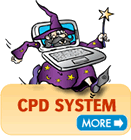How CPD can improve the bottom line - Effectiveness v EfficiencyWhile CPD for some roles is not subject to such strict rules and guidelines as it is for financial advisers, continuing professional development is a way of life for most individuals in the financial services industry. CPD is often viewed as a necessary evil, but it could be turned into a huge benefit, for the firm, for the adviser, and for your customers. In 2007 Deliotte published “In the Dark II”, a global survey about the importance of non-financial information. 100% of Australia’s CFO’s (Chief Financial Officers) agreed that non-financial information was essential but, despite this, most companies rated themselves as ‘poor’ or ‘average’ at obtaining and reviewing non-financial information. Here we are going to look at just one type of non-financial information and how it was applied to the CPD regime at a financial advisory firm. We often hear of ‘efficiency’ savings when businesses merge or when cost cutting measures are implemented. This is where profits are increased purely through reducing costs rather than increasing sales. There is no element of ‘speculate to accumulate’ with efficiency saving activities; it is not a long term strategy for growth, it is usually an exercise in making things look good ahead of the next audit or inspection, bonus time, dividend day or next election. Efficiency savings is often an example of short-termism. Ethically, all businesses should be striving to maximise long-term owner value, not short-term, owner value! It is when a business focuses too much on delivering value in the short term (i.e. cost-cutting to make the figures look good) that so much goes wrong and customers get increasingly poor service. If business executives are in for the long haul, and they take the long-term view of the business they run, the outcome for all concerned can be a positive one. But, in order to start working on the long-term outlook, without producing poor short-term results, everyone involved in that business needs to begin by examining ‘effectiveness’. Unlike bare statistics, effectiveness is very hard to measure or quantify. Introducing effective strategies may initially cost more, and produce a short-term reduction in profits. This is often viewed as untenable by some executives and business-owners, but they need to overcome this if sustainable long-term benefits are to be felt. The new board of directors at the first firm, we will call it Efficiency Ltd, starts producing weekly management accounts from which it analyses every cost in minute detail. Any spike in costs, high payment or expensive service is questioned and then eliminated. This regime has been in place for just three months and already huge increases in profits are starting to show in the weekly accounts. Smiling faces all around the boardroom! The new board of directors at the second firm, Effectiveness Limited, has decided to examine non-monetary indicators as well as the management accounts. These are more difficult to obtain and it takes six months to arrive at a comprehensive set of measures designed to improve the customer experience and quality of advice. Profits have dipped and the board are nervous about the next shareholders’ meeting. Twelve months later… Effectiveness Limited is now seeing profits start to increase. The board continue to examine qualitative data, such as customer surveys and staff feedback, and to tweak their processes frequently in line with suggestions made. The board are rewarded with happy shareholders, low staff turnover and no complaints. So what sort of things did Effectiveness Limited do that Efficiency Ltd missed? Meanwhile at Effectiveness Limited, the new board also noted considerable expenditure on CPD but, instead of slashing the budget, they spoke with all of the staff, and asked advisers to evaluate the quality of different training activities and describe the value achieved from events. They were then asked what could be done to make CPD less of a grind. The advisers mentioned that, whilst they enjoyed face to face training courses and conferences, these required too much time away from the office and they would prefer to limit conference attendance to a minimum. They would prefer to use an online training package instead, preferably one that would automatically log their online training and let them record offline activities too. They still wanted to take advantage of networking opportunities to keep in touch with others in the industry, but not as often. On the advisers’ recommendation, the board signed up for a comprehensive training and CPD package, professional memberships that included some free educational conferences, and allowed the advisers to set their own CPD agendas subject to compliance approval. The result was advisers spending more time on productive work, happily completing some of their CPD in their own time and generally being more effective at work. So how did this one difference make Effectiveness Ltd more profitable? This made the business a better place to be, with better skilled and more satisfied advisers who dealt with the customers more efficiently. The efficiency, the culture of feeding back and being listened to, and the general wellbeing emanating from this and other similar initiatives led to a steady stream of referrals for Effectiveness Limited. Their bottom line grew accordingly, the firm retained the advisers it had invested so much time and effort into training and attracted new quality advisers, and the board was congratulated by the shareholders. Our tips for success
If any of your advisers are picked to be one of the 10% surveyed by their accredited body, will they be ready? Are your advisers astonishing your clients with their up to date knowledge and depth of understanding? Does your firm have all the learning materials essential to the provision of up-to-date, good financial advice? In our opinion, if a job is worth doing, it’s worth doing properly - which is why we provide an affordable, simple and effective solution to planning training, demonstrating competence and meeting regulatory requirements with the minimum of fuss and disruption. That is the basis on which we developed our Wizard Learning CPD system. |


